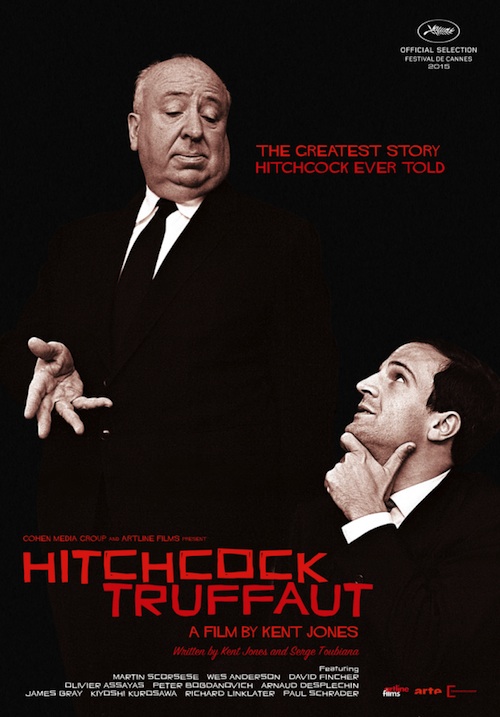By Joe Bendel. Few directors ever became a popular celebrity like Alfred Hitchcock. His imprimatur and famous profile were used to brand books, magazines, and even a television show. Yet, as bizarre as it seems to us today (with Vertigo recently eclipsing Citizen Kane on the Sight & Sound critics poll), in the early 1960s, Hitchcock was not widely hailed as an artist. The exception was in France, particularly among Cahiers du Cinema’s circle of critics and filmmakers. That most definitely included François Truffaut. He convinced the Master of Suspense to sit for an epic eight day interview that would eventually be edited into one of the most treasured film books of all time. Kent Jones uses the fiftieth anniversary of its publication as a springboard to celebrate the films it analyzes in Hitchcock/Truffaut, which opens this Wednesday in New York.
In 1962, Hitchcock only had a handful of films ahead of him, but that would include iconic films like The Birds and Marnie, as well as Frenzy, the late career masterwork the public really missed the boat on in 1972. By this time, Hitchcock had completed signature films like Vertigo that would largely out of public circulation for decades. In the pre-video era, reading Hitchcock/Truffaut became the only way to get a shot-by-shot sense of the master’s work.
 In case we doubt that fact, Jones enlists a relatively small but eminent cast of filmmakers to explain how much the book has meant to them. Not surprisingly, many are alumni of the New York Film Festival, including Martin Scorsese, who often appears in filmmaking documentaries and David Fincher, who is considerably less ubiquitous. There are no slouches in H/T, but it seems a strange how little screen time Kiyoshi Kurosawa gets, considering he is probably the closest to Hitchcock stylistically.
In case we doubt that fact, Jones enlists a relatively small but eminent cast of filmmakers to explain how much the book has meant to them. Not surprisingly, many are alumni of the New York Film Festival, including Martin Scorsese, who often appears in filmmaking documentaries and David Fincher, who is considerably less ubiquitous. There are no slouches in H/T, but it seems a strange how little screen time Kiyoshi Kurosawa gets, considering he is probably the closest to Hitchcock stylistically.
Frankly, Jones’ wandering focus makes it tricky to nail down his precise intentions. Although he incorporates considerable excerpts from the surviving audio tapes, he is not solely concerned with the book and interview. There is some background context provided for both titular filmmakers, but he clearly privileges Hitchcock well above Truffaut. In fact, Jones does not even explore Truffaut’s Hitchcockian films, like Mississippi Mermaid and The Bride Wore Black. Rather, it often seems like Jones is content to follow the points raised by his cast of filmmakers and the commentary of Hitchcock himself, in an almost freely associative manner. While that makes it hard to elevator-pitch H/T, its Hitchcock-centrism still makes for fascinating viewing. Let’s be honest, most of us could happily listen to the old master discuss the catering on Topaz.
Jones simply can’t go wrong with Hitchcock. Even if we can’t precisely spell out the film’s thesis, it further buttresses our general cineaste convictions that Hitch was one of the craftiest, wittiest auteurs to ever look at the world through the lens of a camera. Abundantly watchable, Hitchcock/Truffaut is highly recommended for Hitchcock fans (and somewhat so for Truffaut and Nouvelle Vague admirers as well) when it opens this Wednesday (12/2) in New York, at Film Forum.
LFM GRADE: B
Posted on November 30th, 2015 at 10:56pm.